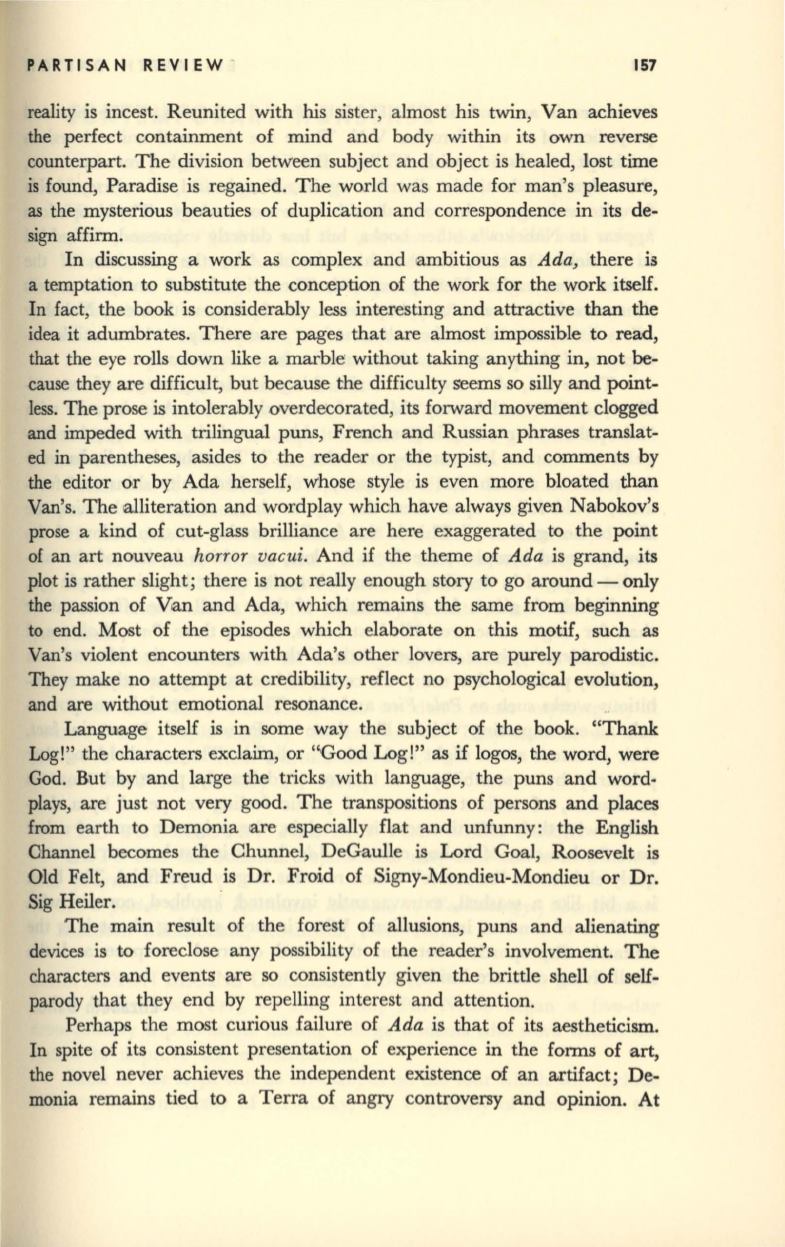
PARTISAN REVIEW
157
reality is incest. Reunited with his sister, almost his twin, Van achieves
the perfect containment of mind and body within its own reverse
counterpart. The division between subject and object is healed, lost time
is found, Paradise is regained. The world was made for man's pleasure,
as the mysterious beauties of duplication and correspondence in its de–
sign
affirm.
In discussing a work as complex and ambitious as
Ada,
there is
a temptation to substitute the conception of the work for the work itself.
In fact, the book is considerably less interesting and attractive than the
idea it adumbrates. There are pages that are almost impossible to read,
that the eye rolls down like a marble without taking anything in, not
be–
cause they are difficult, but because the difficulty seems so silly and point–
less. The prose
is
intolerably overdecorated, its forward movement clogged
and impeded with trilingual puns, French and Russian phrases translat–
ed
in
parentheses, asides to the reader or the typist, and comments by
the editor or by Ada herself, whose style is even more bloated
than
Van's. The alliteration and wordplay which have always given Nabokov's
prose a kind of cut-glass brilliance are here exaggerated to the point
of an art nouveau
horror vacui.
And if the theme of
Ada
is grand, its
plot is rather slight; there is not really enough story to go around - only
the passion of Van and Ada, which remains the same from beginning
to end. Most of the episodes which elaborate on this motif, such as
Van's violent encounters with Ada's other lovers, are purely parodistic.
They make no attempt at credibility, reflect no psychological evolution,
and are without emotional resonance.
Language itself is in some way the subject of the book. "Thank
Log!" the characters exclaim, or "Good Log!" as if logos, the word, were
God. But by and large the tricks with language, the puns and word–
plays, are just not very good. The transpositions of persons and places
from earth to Demonia are especially flat and unfunny: the English
Channel becomes the Chunnel, DeGaulle is Lord Goal, Roosevelt is
Old Felt, and Freud
is
Dr. Froid of Signy-Mondieu-Mondieu or Dr.
Sig Heiler.
.
The main result of the forest of allusions, puns and alienating
devices is to foreclose any possibility of the reader's involvement. The
characters and events are so consistently given the brittle shell of self–
parody that they end by repelling interest and attention.
Perhaps the most curious failure of
Ada
is that of its aestheticism.
In spite of its consistent presentation of experience in the forms of art,
the novel never achieves the independent existence of an artifact; De–
monia remains tied to a Terra of angry controversy and opinion. At


